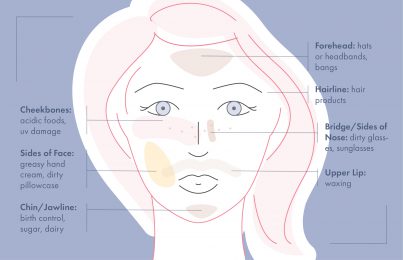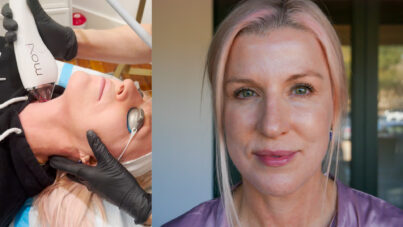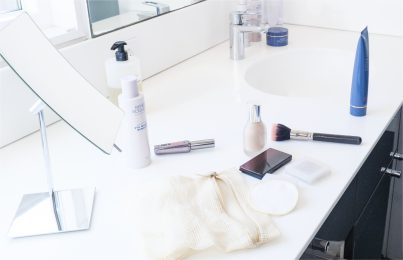Updated 11/16/24. Even though the nose is often very oily compared to other areas of the face, many people experience dryness and flakiness for what seems like no apparent reason. In reality, there are a few reasons why the nose can be the only area of the face to get dry and flaky. Keep reading to learn what they are and see some possible solutions, so you can get your skin back to a healthier and more hydrated state in no time.
- Why Does My Nose Get Dry and Flaky?
- 1. You Might Be Using Skincare Products That Are Too Drying
- 2. You Might Be Over-Exfoliating
- 3. You Might Not Be Exfoliating Enough
- 4. You Might Not Be Applying Your Skincare Products Evenly
- 5. You Might Be Blowing Your Nose Too Frequently
- 6. You Might Have Eczema
- 7. You Might Have Pre-Cancerous Cells on Your Nose
Why Does My Nose Get Dry and Flaky?
There are six common reasons your nose gets dry and flaky when the rest of your face doesn’t.
1. You Might Be Using Skincare Products That Are Too Drying
Particularly along the bridge of the nose, the skin can be quite thin, so if you’re experiencing dryness, flakiness, and peeling in that area, it could be that you’re using overly-drying skincare products. These products can disrupt your moisture barrier, putting it in a vulnerable condition and causing constant dryness and peeling.
The moisture barrier serves an important function. It’s like the skin’s personal bodyguard, keeping the good (moisture) in and the bad (environmental aggressors) out. Skincare products that are too stripping can cause damage in the form of tiny, invisible cracks, which allow moisture to easily escape. The result is skin that appears excessively dry and flaky. This is made even worse during cold winters and in areas of low humidity (for example, Arizona in the summertime).
To resolve this, the first thing to do is re-analyze your skincare routine. Make sure you’re not using anything that could be causing a dry, flaky nose in the first place. This includes bar soaps, harsh foaming cleansers, and alcohol-based toners. These products can reduce hydration levels in the skin, which is never a good thing. Swap them out for a gentle, sulfate-free cleanser and a hydrating, alcohol-free toner that are both formulated for your specific skin type. If you don’t know your skin type, take the skin type quiz.
Keep in mind that there’s a difference between dry and dehydrated skin, and it’s important to know the difference.
2. You Might Be Over-Exfoliating
To get rid of the dry skin around the nose, along with the flaking and peeling, a person’s first reaction is often to try and remove it through exfoliation. This could be with a physical exfoliant, like a face scrub, washcloth, or cleansing brush. It could be with a chemical exfoliant, like an exfoliating acid serum or mask. Or, it could be a combination. Either way, increasing exfoliation could be removing too many protective cells, allowing for moisture to escape because of the deterioration of your barrier. I have heard so many people say, “I’m exfoliating a lot but it’s not helping the dry skin around my nose at all.” Sound familiar?
The solution for this is to stop using all exfoliants for two weeks. The goal here is to see if the skin starts to repair itself with less visible dryness and flakiness. From my experience, I usually find that it’s a combination of using overly-drying products and over-exfoliating. Make sure to read my guide to exfoliation.
3. You Might Not Be Exfoliating Enough
Or…you might need to exfoliate more! Conversely, if you’re not using exfoliants, then you introducing one might help to shed the dry skin cells that have accumulated. Incorporating a leave-one exfoliating acid serum like Pro Results Power Serum a few nights a week will lower the pH of the skin and truly dissolve the dryness. This might correct the dryness quickly!
4. You Might Not Be Applying Your Skincare Products Evenly
If dryness and flakiness appear in the corners of your nose, it might be due to how you’re applying your skincare products. You see, when someone applies a product with active ingredients, such as exfoliating acids or retinol, it’s not uncommon for large amounts of the product to collect and settle in the crevices of the corners of the nose. Since these products can smooth skin texture, and are often very potent, they can be too strong when too much is used.
I know this first-hand after 35 years of giving professional chemical peels to my clients. I have to be really careful when it comes to application in this area since the product will naturally settle here, act too strongly, and cause dryness and flakiness. To prevent this, I apply petroleum jelly in the crevices around the corners of the nose and the mouth. This prevents the peel from collecting.
5. You Might Be Blowing Your Nose Too Frequently
When you’re constantly rubbing tissue against your nose due to allergies or a cold, it creates friction. This friction can damage your skin’s barrier and deplete moisture from between the cells. What happens next? Dryness, flakiness, and peeling. To avoid this, I suggest using soft, “moisturizing” tissues. These feel less scratchy and cause less irritation. I also suggest applying a well-formulated face oil or moisturizer to your nose after blowing it. This can help replenish the skin’s moisture levels.
6. You Might Have Eczema
Eczema, which is also known as Atopic Dermatitis, is a condition that can cause dryness, redness, flakiness, and peeling, often on the nose. It’s usually fairly easy to detect and more than likely shows up in multiple areas at the same time, such as on the eyelids or along the hairline. It has to do with an impaired skin barrier, so the goal is to try and correct it. My best advice is to start by moisturizing often and using ingredients that can calm and soothe irritation. Look for barrier repair ingredients like ceramides, usnic acid, vitamin E, and licorice extract.
7. You Might Have Pre-Cancerous Cells on Your Nose
We all know how important it is to get regular skin checks from a dermatologist. What most people aren’t aware of is that dry, rough, and flaky areas, known as actinic keratosis, can be a potential indication of early stages of skin cancer. As an esthetician working hands-on with skin for over 30 years, I’ve detected dry areas on my client’s faces that seemed a little suspicious. When I encounter this, I refer them to a dermatologist. Many times, it was in fact early signs of skin cancer (which can be treated fairly easily, by the way). In fact, I had my own scare with actinic keratosis!
The nose is one area of the face that can get more sun damage than other areas. The reason is that it secretes the most oil (which is why pores are largest on the nose), and oil can degrade sunscreen, leaving this area susceptible to UV exposure. This is just another reason why it’s so important to diligently reapply sunscreen throughout the day.
Whenever the skin isn’t acting how it should be, and in this case, the skin on the nose is consistently dry, flaky, and peeling, you must really listen to it and pay attention to your habits. Additionally, consider making adjustments to your skincare routine to determine the underlying cause. With the right care and the right products, you can be on your way to smoother and healthier-looking skin!
Next, read up on 8 annoying winter skin issues (and how to fix them)!
Celebrity Esthetician & Skincare Expert
As an esthetician trained in cosmetic chemistry, Renée Rouleau has spent 35 years researching skin, educating her audience, and building an award-winning line of products. Her hands-on experience as an esthetician and trusted skin care expert has created a real-world solution — products that are formulated for nine different types of skin so your face will get exactly what it needs to look and feel its best. Trusted by celebrities, editors, bloggers, and skincare obsessives around the globe, her vast real-world knowledge and constant research are why Marie Claire calls her “the most passionate skin practitioner we know.”




Comments:
Countiuous peeling on nose..no redness to complexion, moisturizer do reduce peeling, not sun burn, no itchiness, do not use any harsh chemicals or makeup products, no large pores. Wear sun block, hats. This has just occurred in last 6 month-year. Any suggestions?
Thanks
Susan
Posted By: Susan goldberg |
Hi Susan! Thank you for reaching out, I suggest seeing a dermatologist about this to help determine what is causing the peeling.
Posted By: Renée Rouleau |